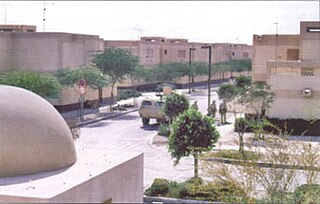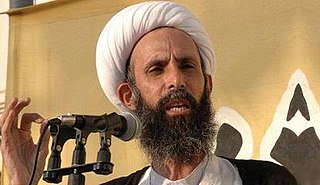Related Research Articles

The economy of Saudi Arabia is one of the top twenty economies in the world (G20). It is dependent on oil as the country has the second-largest proven petroleum reserves, and the country is the largest exporter of petroleum in the world. It also has the fifth-largest proven natural gas reserves and is considered an "Energy Superpower". With a total worth of US$33.2 trillion, Saudi Arabia has the second most valuable natural resources in the world.

The Cooperation Council for the Arab States of the Gulf, originally known as the Gulf Cooperation Council, is a regional intergovernmental political and economic union consisting of all Arab states of the Persian Gulf except Iraq, namely: Bahrain, Kuwait, Oman, Qatar, Saudi Arabia, and the United Arab Emirates. The Charter of the GCC was signed on 25 May 1981, formally establishing the institution.

Saudi Aramco, officially the Saudi Arabian Oil Company, is a Saudi Arabian multinational petroleum and natural gas company based in Dhahran, Saudi Arabia.

The Kingdom of Saudi Arabia is an Islamic absolute monarchy in which Sunni Islam is the official state religion based on firm Sharia law. Non-Muslims must practice their religion in private and are vulnerable to discrimination and deportation. It has been stated that no law requires all citizens to be Muslim, but also that non-Muslims are not allowed to have (gain?) Saudi citizenship. Children born to Muslim fathers are by law deemed Muslim, and conversion from Islam to another religion is considered apostasy and punishable by death. Blasphemy against Sunni Islam is also punishable by death, but the more common penalty is a long prison sentence. According to the U.S. Department of State's 2013 Report on International Religious Freedom, there have been 'no confirmed reports of executions for either apostasy or blasphemy' between 1913 and 2013.

Saudi Arabia, officially the Kingdom of Saudi Arabia, is a country in Western Asia constituting the bulk of the Arabian Peninsula. With a land area of approximately 2,150,000 km2 (830,000 sq mi), Saudi Arabia is geographically the largest sovereign state in Western Asia, the second-largest in the Arab world, the fifth-largest in Asia, and the 12th-largest in the world. Saudi Arabia is bordered by Jordan and Iraq to the north, Kuwait to the northeast, Qatar, Bahrain, and the United Arab Emirates to the east, Oman to the southeast and Yemen to the south; it is separated from Egypt and Israel by the Gulf of Aqaba. It is the only nation with both a Red Sea coast and a Persian Gulf coast, and most of its terrain consists of arid desert, lowland and mountains. As of October 2018, the Saudi economy was the largest in the Middle East and the 18th largest in the world. Saudi Arabia also has one of the world's youngest populations: 50 percent of its 33.4 million people are under 25 years old.

Al-Qassim Region, also spelled Qassim, Al-Qaseem, Al-Qasim, or Gassim internationally, is one of the thirteen administrative regions of Saudi Arabia. Located at the heart of the country, and almost in the center of the Arabian Peninsula, it has a population of 1,370,727 and an area of 58,046 km². It is known to be the "alimental basket" of the country, for its agricultural assets.

Human rights in Saudi Arabia for the most part do not exist. The state of human rights in Saudi Arabia is consistently ranked as one of the worst in the world. The Saudi government, which enforces Wahhabi sharia law under the absolute rule of the House of Saud, have been accused of and denounced by various international organizations and governments for violating multiple human rights within the country. The totalitarian regime ruling the Kingdom of Saudi Arabia is consistently ranked among the "worst of the worst" in Freedom House's annual survey of political and civil rights. Qorvis MSLGroup, a U.S. subsidiary of Publicis Groupe, has been working with Saudi Arabia amidst its executions of political protesters and opponents for more than a decade to whitewash its record of human rights abuses.

Ras Al Khafji or Khafji (الخفجي) is a town on the border between Saudi Arabia and Kuwait. It lies in what was before 1970 the Saudi–Kuwaiti neutral zone. The Japanese-owned Arabian Oil Company Ltd signed a concession agreement with the government of Saudi Arabia in December 1957 and with the government of Kuwait in July 1958 for exploration and development of hydrocarbon reserves in the offshore Neutral Zone. The Arabian Oil Company discovered the Khafji oil field in 1960 and the Hout oil field in 1963.

When Saudi Arabia formally became a nation in 1932, education was largely limited to instruction for a select few in Islamic schools. Today, public education—from primary education through college—is open to every Saudi citizen. The second largest governmental spending in Saudi Arabia goes for education. Saudi Arabia spends 8.8 % of its gross domestic product on education, compared with the global average of 4.6%, which is nearly double the global average on education. To this day, Saudi education is centered around the study of Islam, though is now becoming more diverse.

The Islamic Saudi Academy of Washington was an International Baccalaureate (IB) World university preparatory school in Northern Virginia, accredited with the Southern Association of Colleges and Schools and authorized by IB in December 2008. It had classes from pre-kindergarten to twelfth grade, and had a final enrollment of more than 1,200 students. It was funded by the Embassy of Saudi Arabia in Washington, DC. In 2011, ISA graduated its first international baccalaureate class. Four students received their full IB diploma and one of them was able to earn bilingual diploma. As of 2007, approximately 30% of the roughly 1,000 students were Saudi Arabian citizens. The school closed in 2016, replaced by the new King Abdullah Academy later that year.

Serenata is a Philippine children's choir in Jeddah, Saudi Arabia.

The Bangladesh International School Dammam is an international school also a Cambridge affiliate school located in Dammam, Eastern Province, Saudi Arabia.
Multiple forms of media including books, newspapers, magazines, films, television, and content published on the Internet are censored in Saudi Arabia.

The International Indian School Jeddah, formerly known as the Embassy of India School, is an elementary and secondary school for the children of Indian nationals in Jeddah, Saudi Arabia, with boys and girls taught separately in English. It was founded in 1969.

India–Saudi Arabia relations or Indo-Saudi relations are the bilateral relationship between the Republic of India and the Kingdom of Saudi Arabia. Relations between the two nations are generally strong and close, especially in commercial interests. Indo-Saudi bilateral trade reached US$27.48 billion in the financial year 2017–18, up from US$25.1 billion in the preceding year. Saudi Arabia's exports to India stood at US$22.06 billion whereas India's exports were US$5.41 billion.

Abdullah bin Abdulaziz Al Saud was King of Saudi Arabia and Custodian of the Two Holy Mosques from 2005 to his death in 2015. He ascended to the throne on 1 August 2005 upon the death of his half-brother, King Fahd.
The Jubail International School, also known as Al Hussan International School Jubail is a member of the Al-Hussan network of schools, including its sister school Al-Hussan Academy in Al-Khobar, Saudi Arabia. It opened in September 1999 and has KGI to grade 12 with students representing around 18 nationalities. The Saudi Arabia Ministry of Education, General Administration, approves the school for expatriate education. The language of instruction is English.
Saudi Arabia's laws are an amalgam of rules from Sharia, royal decrees, royal ordinances, other royal codes and bylaws, fatwas from the Council of Senior Scholars and custom and practice.

Ayatollah Sheikh Nimr Baqir al-Nimr, commonly referred to as Sheikh Nimr, was a Shia Sheikh in al-Awamiyah in Saudi Arabia's Eastern Province whose arrest and execution was widely condemned, including by governments and human rights organizations.
Foreign workers in Saudi Arabia, estimated to number about 9 million as of April 2013, began migrating to the country soon after oil was discovered in the late 1930s. Initially, the main influx was composed of Arab and Western technical, professional and administrative personnel, but subsequently substantial numbers came from Southeast Asia.
References
- ↑ Angel, William D. The International Law of Youth Rights: Source Documents and Commentary . Dordrecht: M. Nijhoff, 1995. p. 1118
- ↑ "Archived copy". Archived from the original on 2008-12-31. Retrieved 2008-10-15.CS1 maint: archived copy as title (link)
| This article about an organization in Saudi Arabia is a stub. You can help Wikipedia by expanding it. |